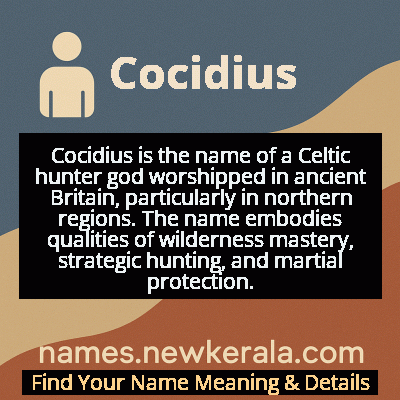Cocidius Name Meaning & Details
Origin, Popularity, Numerology Analysis & Name Meaning of Cocidius
Discover the origin, meaning, and cultural significance of the name COCIDIUS. Delve into its historical roots and explore the lasting impact it has had on communities and traditions.
Name
Cocidius
Gender
Male
Origin
Celtic
Lucky Number
2
Meaning of the Name - Cocidius
Cocidius is the name of a Celtic hunter god worshipped in ancient Britain, particularly in northern regions. The name embodies qualities of wilderness mastery, strategic hunting, and martial protection.
Cocidius - Complete Numerology Analysis
Your Numerology Number
Based on Pythagorean Numerology System
Ruling Planet
Moon
Positive Nature
Diplomatic, friendly, artistic, empathetic.
Negative Traits
Over-sensitive, moody, indecisive, prone to self-pity.
Lucky Colours
Green, cream, white.
Lucky Days
Monday.
Lucky Stones
Pearl, moonstone.
Harmony Numbers
1, 3, 4.
Best Suited Professions
Diplomats, mediators, caregivers, artists.
What People Like About You
Cooperative spirit, friendliness, artistic talent.
Famous People Named Cocidius
Cocidius the Hunter
Mythological Figure
Celtic deity worshipped in northern Britain, particularly in Hadrian's Wall region
Marcus Cocidius Verus
Roman-British Military Officer
Documented in Roman inscriptions as a devotee who made offerings to the god Cocidius
Cocidius of the Brigantes
Tribal Leader/Religious Figure
Local chieftain or priest who promoted Cocidius worship among the Brigantes tribe
Name Variations & International Equivalents
Click on blue names to explore their detailed meanings. Gray names with will be available soon.
Cultural & Historical Significance
His cult was particularly strong among the Brigantes and other northern tribes, where he was seen as a protector of hunters, warriors, and the wilderness itself. The persistence of his worship into the Roman period demonstrates the enduring power of native British religious traditions even under foreign rule. Cocidius represents an important example of religious syncretism, where Celtic and Roman traditions merged, creating a unique Romano-British religious landscape that preserved indigenous beliefs while adapting to new political realities.
Extended Personality Analysis
Individuals named after Cocidius would likely embody traits of independence, strategic thinking, and physical prowess. As a hunter deity, Cocidius represents patience, observation, and the ability to move silently and purposefully toward goals. There's a strong connection to nature and wilderness, suggesting someone comfortable in solitary pursuits yet capable of decisive action when required. The warrior aspect of Cocidius adds dimensions of courage, protection, and tactical intelligence.
This combination creates a personality that balances contemplative observation with swift, effective action, making them both thoughtful planners and capable executors of their intentions. They would likely possess strong survival instincts, adaptability to changing circumstances, and a deep respect for natural cycles and boundaries. The Cocidius personality type tends to be protective of their community or family while maintaining a degree of independence, much like the deity who protected frontiers while roaming the wild landscapes of northern Britain.
Modern Usage & Popularity
In contemporary times, Cocidius remains an extremely rare given name, primarily used by enthusiasts of Celtic history and mythology or in historical reenactment communities. Its usage is almost exclusively confined to academic circles, pagan reconstructionist groups, and families with strong connections to Celtic heritage. The name has not entered mainstream naming trends and maintains its status as a specialist or niche choice. However, there has been a slight increase in interest among parents seeking unique mythological names with strong cultural roots, though it remains far less common than other Celtic deity names like Lugh or Bran. The name's association with hunting and warfare gives it a masculine, strong character that appeals to those looking for names with historical depth and cultural significance.
Symbolic & Spiritual Meanings
Symbolically, Cocidius represents the intersection of wilderness and civilization, hunting and warfare, strategy and action. He embodies the concept of the 'noble hunter' - someone who respects nature while mastering its challenges. The name carries connotations of protection, particularly of borders and boundaries (reflecting his popularity in frontier regions like Hadrian's Wall). It symbolizes the ability to navigate between different worlds - the civilized and the wild, the planned and the spontaneous. As a deity worshipped by both native Britons and Roman soldiers, Cocidius also represents cultural synthesis and the preservation of indigenous traditions amid foreign influence, making the name symbolic of resilience and cultural endurance.

